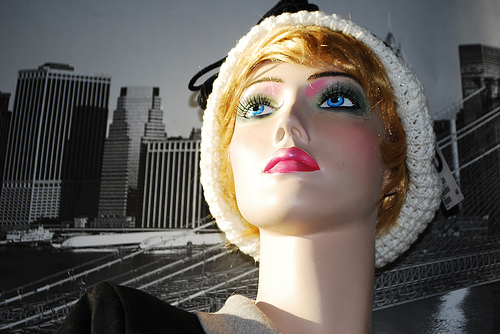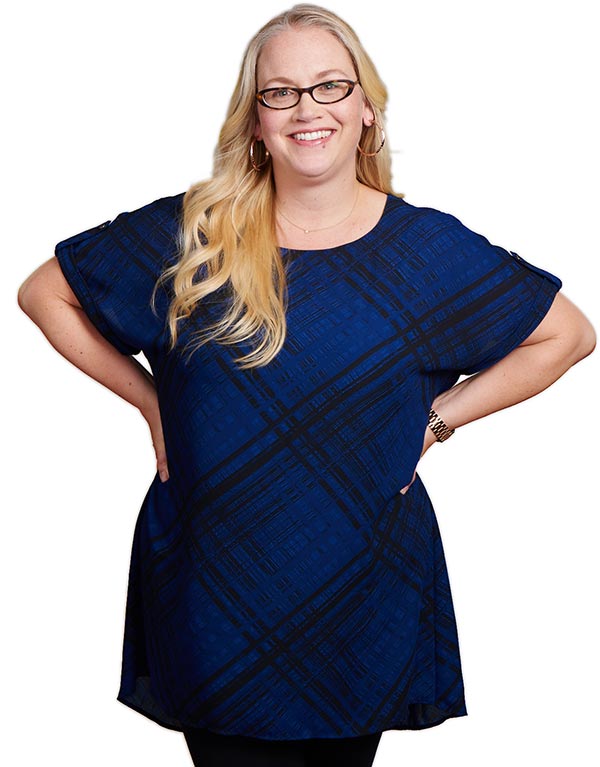 Beliefs about weight and our bodies come from all kinds of sources, including family, friends, art, fashion, movies, books, and yes, magazines. That’s why it’s so important for all of us to be literate media consumers—to know the realities of what goes into producing the media we all love to eat up every day. Here’s a little something I call Media Images 101 (I wrote this as a guest post for Delta Delta Delta’s Fat Talk Free Week and wanted to share it with all of you):
Beliefs about weight and our bodies come from all kinds of sources, including family, friends, art, fashion, movies, books, and yes, magazines. That’s why it’s so important for all of us to be literate media consumers—to know the realities of what goes into producing the media we all love to eat up every day. Here’s a little something I call Media Images 101 (I wrote this as a guest post for Delta Delta Delta’s Fat Talk Free Week and wanted to share it with all of you):
I was walking by a newsstand the other day when a pictures of a pretty, pointy-nosed blond woman on the cover of Harper’s Bazaar caught my eye. “Who isthat?” I thought. After staring for a few seconds I realized it was Drew Barrymore. Actually, I wasn’t really that surprised at how different she looked. Why? I’ve worked in magazines for almost 10 years, and I understand that the images you see on the cover aren’t really photographs.
They’re more like paintings. They’re true pieces of artwork that have been painstakingly created not just by the hair, makeup, and lighting folks at the photoshoots, but also by art directors and retouchers who go over every centimeter with Photoshop. They take out any weird little clothing wrinkles, soften facial lines, and remove skin spots that somehow still managed to get through all that makeup and flattering lighting. Sometimes they even do things like add more hair, whiten teeth, and darken makeup.
These images created for covers and for ads are pieces of art, not reality. And it’s important for girls and women to remember that. You can’t compare yourselves to those pictures; a lot of times, even the people in the pictures don’t look like the pictures! Just ask Whitney Thompson, the first plus size winner of America’s Next Top Model, who I interviewed last week when she was in town for the National Eating Disorders Association conference: “I think [airbrushing] even sets up unrealistic expectations for yourself,” she told me. “When I see myself on a billboard in Times Square and I’m looking at my face, your ego gets really big. [But] you’re walking down the street and I don’t look like that. I have sun spots, I’m getting wrinkles, I’m 23 and I’m from Florida, so I age and you don’t see that in pictures.”
Whether that’s right or wrong, I’ll leave to other people to debate. For me, I just know that’s the way things are, and it’s important for all of us to know it. Here’s a good rule of thumb to keep in mind when it comes to pictures of models or famous people in ads, magazines, and other mass media: Unless a photo is a part of a news story or other photojournalism piece, a “gotcha” kind of paparazzi shot, or you’re told explicitly in the caption or text of an accompanying story that the image has not been altered, some type of retouching has taken place. Sometimes it’s as simple as smoothing out the wrinkles in a model’s shirt or changing her nail polish color, other times it’s erasing veins or dimples from her legs or dark circles under her eyes.
The bottom line? Media images are not reality—so the next time you find yourself tempted to compare your real, flesh and blood, breathing, living, working, body to a two-dimensional image of a model or celebrity in print, online, or on screen, stop and remember this mantra: When it comes to looking perfect, life doesn’t have to imitate art, in fact, it can’t!
Now, a question for you: Do you ever compare yourself to images of models or stars you see in magazines or in movies? Did you used to? How can you remind yourself that these images we see aren’t reality? xo…Sunny




This is a fantastic reminder about the reality behind the images we’re inundated with every day. For a research study I did, I went into a high school and taught media literacy classes, talking a lot about the techniques used by companies to enhance images. The girls I worked with were often shocked at the extremes to which these companies go to create “perfect” images. What you see is not what you get.
I used to be such a comparer when it came to magazines and movies and television, I eventually grew out of that. I still don’t buy magazines at all unless they’re education related because of that temptation. The other day, I was at Walmart and had some time to kill when getting some pictures developed…I found myself drawn to the magazine selection. I found myself picking up an Oxygen magazine and skimming through it…trying to “improve” myself by the articles in it. It didn’t make me feel too good about myself.
For me now, I feel that I have the hardest time with comparing myself to those that I know and communicate with in my real life. The people that I don’t know on a more personal level, I find myself comparing my outsides to, but the people that know about my issues and vice versa, I tend to compare my insides to theirs. How much more selfless they are, how more analytical they are, how much spiritually stronger they are than I am, etc. It’s just really difficult sometimes. I realize though that I was made and created the way I was for a reason and that the qualities I do possess are the ones I were meant to possess. (Okay, my stubbornness and sarcasm get me into trouble sometimes but some people like my sense of humor and the fact that I stand for what I believe in). See, even my negative qualities can be worked for the greater good!
So for me, my outward comparisons have to do with my inward manifestations that I am displeased with. Coming to terms with the person I am on the inside helps me to be more accepting of the person I am on the outside…It’s a daily battle, but I’m inching my way there, bit by bit.
I was a big comparer for a long time, and occasionally I find myself doing it still. When I was in my teens, and I finally realized how detrimental it was to me, I cancelled all my subscriptions to fashion magazines until I could handle looking at them and not comparing myself. *Note: this took YEARS. It wasn’t until I was about 23 that I felt comfortable enough to get back into the magazines without destroying my self esteem.
Even when they’re candid shots (like at the “Oscars”), what I find as I get older is that they remind me of my youth and thereby make me feel less happy about aging.
There is that picture of Keira Knightley in a gold low cut dress on a red carpet that makes me feel old. I used to have that skinny arms, sternum showing, no boobs look myself when I was young-naturally. I can see my sternum again since I lost my excess weight, and I’m still small busted, but the midlife tummy and bigger swing-when-I-wave arms are definitely there-and looking at someone like that reminds me I’m not as young as I used to be.
And then they photoshop the older women to look younger so you don’t see the wrinkles on the 40 year olds… I don’t want to look like a celebrity-but I miss how I used to look sometimes…and I can pass for late 30s/40ish in my mid 40s…I’m not even that old looking for my age!
I don’t think I ever compared myself knowingly to people in magazines, but I still think the media probably made a bad situation worse. I know I looked to people like Nicole Richie (who I still admire for her style, lovely personality and design talent) for unhealthy reasons. I wanted to inspire the kind of gawping stares her poor thin body drew at her least healthy.
This was not healthy. Yet I still think the media only played a small part in my food issues and I stand by the view that eating disorders and an unhealthy relationship with one’s body tends to come from serious, deep emotional issues, largely from being young.
At the same time, I think it’s important we try and make the media as accurate and fair in portraying people as we can reasonably expect. I know (and I also know other people who do this) I say mean things about people on TV and in magazines, particularly about their bodies, when I am feeling low, vulnerable and in need of reassurance. It is jealousy for want of a better (and less embarrassing) thing to say, which is no doubt made worse by the media portraying people as more than perfect.
I stopped buying mags around 15 years ago ?
I used to compare myself, I think. Also having been behind the scenes on photoshoots, mousey looking chicks turning into glam goddesses…. h o u r s later..